Hippocrates, “the father of medicine,” has rightly described Nature as the best physician. Since ancient times, different parts of plants like leaves, seeds, flowers, roots and stems have been used for their medicinal value. One such plant which is of great significance is dronapushpi. Dronapushpi is a herb commonly found in India, from the Himalayas and down to Ceylon. The scientific name of this plant is Leucas aspera, and it belongs to the family Lamiaceae. In Sanskrit, it is known as dronapushpi, chitrak-shupa and chitrapathrika. In Hindi, it is called goma madhupati. It is known as thumbai, bahuphul in Marathi and Tunni in Southern India. In this article, we will learn more about dronapushpi, its health benefits, side effects, precautions, etc1.
Dronapushpi contains different types of phytochemicals, which include phytosterols (plant sterols) like β-Sitosterol and its glycoside and terpenes (organic compounds found in oils) like norlabdane, labdane, abietane-leucasdins A, B, C and leucastrins A and B. The oil of dronapushpi contains fatty acids like adipic acid, laballenic acid, tridecanoic acid, lauric acid and glutaric acid2.
Dronapushpi shows numerous scientifically proven properties, some of which are mentioned below:
Based on a study2 I read, it was found that dronapushpi flower balls might provide a satisfying combination of carbohydrates, fats, proteins, iron, and calcium. Thus, they may offer a convenient and tasty option that may be enjoyed as a snack while providing the body with valuable nourishment.
Dr. Smita Barode, B.A.M.S, M.S.
Some of the potential benefits of dronapushpi are described below.
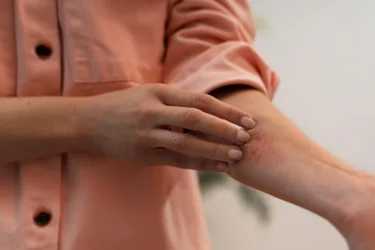
Literature states that dronapushpi may have the potential to kill harmful fungi. Prajapati et al. conducted a study1 in 2010. The findings of this study showed that leaves obtained from dronapushpi plant helped in killing fungi like Microsporum gypseum and Trichophyton rubrum. This indicates that it may have the potential to manage hair, skin, scalp and nail infections caused due to these fungi. However, we have yet to claim these results with greater reliability. It is further advised not to self-medicate and consult your physician for proper treatment of any fungal infection.

Ayurvedic literature supports the use of different plant extracts that may help manage bacterial infections. A study1 conducted by Prajapati et al. in 2010 stated that the oil extracted from dronapushpi might arrest the growth of bacterias like S.aureus, S.typhi, K.aerogenes, E.coli and P.vulgaris and may have the potential to manage pneumonia, typhoid, urinary tract infections and diarrhoea caused by these bacteria. However, due to limited studies, it is advised not to rely on dronapushpi as a remedy and kindly consult your physician for the proper management of any bacterial infections.

Ever wondered what happens to the food that we eat? The food that we eat is broken down into glucose by enzymes like alpha-glucosidase and alpha-amylase. Verma et al. 2017 conducted a study8, and the results of this study show that dronapushpi may help lower blood glucose and may have a positive impact on diabetes. This effect is due to the inhibition of alpha-amylase, which helps in reducing blood glucose levels. However, we need more studies to claim these results with greater reliability. Also, it is advised not to consider dronapushpi as an alternative to modern medicine; you should always consult your doctor for proper management of diabetes3.

Literature studies support the use of herbs like dronapushpi for managing fever. A study1 conducted by Prajapati et al. in 2010 stated that dronapushpi might help reduce body temperature if you have a fever. Additionally, it may help manage the cough. This indicates that this herb may positively impact fever and cough. The exact mechanism behind these effects is unclear, and thus, you should not rely on dronapushpi for the treatment of fever or cough. It is best to consult your doctor for the proper treatment.
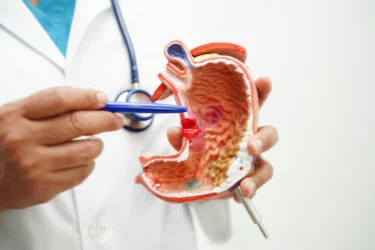
Peptic ulcer or gastric ulcers are sores on the lining of the stomach, food pipe (esophagus) or small intestine. Ulcers are usually associated with stomach pain, indigestion and acid reflux. Many literature studies2 support the use of herbal preparations like dronapushpi for managing ulcers. Hiremath et al., in 2022 stated that this herb may help in reducing gastric acid production and, thus, help manage ulcers. However, it is advised not to consider dronapushpi as an alternative to modern medicine, and you should consult your doctor for the proper management of peptic ulcers.
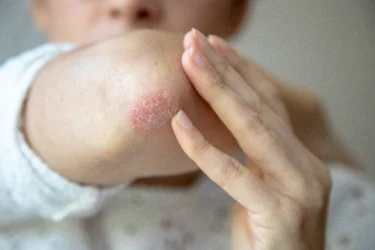
Psoriasis is a skin disease that causes rashes, itchiness, and scaly skin. A review4 conducted by Singh et al. in 2022 stated that the presence of antioxidants in dronapushpi may help eliminate the harmful radicals from the body and helps relieve skin itchiness and rashes. This indicates that dronapushpi may positively impact psoriasis. However, you should not consider it as an alternative to modern medicine; it is always advised to consult a physician for the proper management of psoriasis.

Studies show that compounds extracted from different parts of the plants may positively impact prostate cancer. Anjusha et al. conducted a study5 in 2017, the results showed that dronapushpi might have the potential to manage prostate cancer. To claim these results with greater reliability, we need more studies. It is further advised not to consider dronapushpi as an alternative to modern medicine; kindly consider your doctor for the proper management of prostate cancer5.
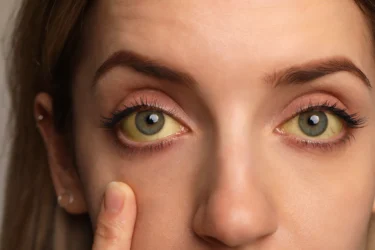
Jaundice is a disease condition characterised by the yellowing of skin, nails and eyes due to an increase in bilirubin (a breakdown product of red blood cells). Literature studies6 support the use of dronapushpi to reduce bilirubin. A review which was conducted by Das et al. in 2012 stated that the hot water extract of the entire plant of dronapushpi might help manage jaundice. However, you should not consider this herb as an alternative to modern medicine and should consult your doctor for proper treatment of jaundice.
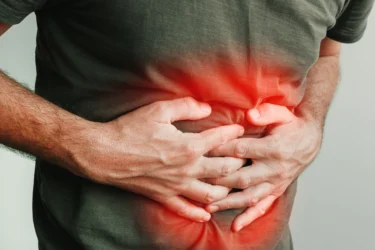
Though there are studies that show the benefits of dronapushpi in various conditions, these are insufficient, and there is a need for further studies to establish the true extent of the benefits of dronapushpi on human health.
From what I have read, the utilisation of the entire dronapushpi plant in a particular herbal composition has been patented for its effectiveness in dealing with epileptic convulsions and cerebral function disorders. This indicates that researchers may have found positive outcomes in using a combination of different parts of the dronapushpi plant, constituting 70% of the herbal composition, to address conditions such as seizures and problems related to brain function9.
Dr. Siddharth Gupta, B.A.M.S, M.D (Ayu)
You must consult a qualified doctor before consuming any herbal supplements. You should not discontinue or replace your ongoing treatment of modern medicine with an ayurvedic/herbal preparation without consulting your doctor.
One interesting but surprising use I have come across is the smoking of dried dronapushpi inflorescences and exhaling the smoke through the nose to possibly address nose bleeds. This unique practice suggests that dronapushpi may have been traditionally employed as a remedy for managing nose bleeding9.
Dr. Rajeev Singh, BAMS
Hiremath et al. conducted a study5 in 2022 which found that dronapushpi may result in CNS depression or slowing down of brain activity, which can result in nausea, vomiting, reduced heart rate and breathing, confusion and memory loss.
Dronapushpi is considered a safe formulation; however, if you experience any adverse reactions to dronapushpi, it is advised to discontinue its intake and immediately contact a doctor or your Ayurvedic physician who has prescribed it, as they will guide you properly for your symptoms.
Also Read: Triphala Ghrita: Uses, Benefits, Side effects & more!
Consuming dronapushpi is okay if taken in moderate amounts. However, the following considerations must be taken:
Also Read: Kabasura Kudineer: Uses, Benefits and Side Effects By Dr. Rajeev Singh
However, you must always seek the advice of your Ayurvedic physician about the possible interaction of dronapushpi with other drugs.
The scientific name of dronapushpi is Leucas aspera, and it belongs to the family Lamiaceae1.
In Hindi, dronapushpi is called as goma madhupati1.
Hiremath et al. conducted a study5 in 2022 which found that dronapushpi may result in CNS depression which can result in nausea, vomiting, reduced heart rate and breathing, confusion and memory loss.
Yes, studies have supported the use of dronapushpi may help in reducing blood glucose and may help manage diabetes2.
The safety of dronapushpi during pregnancy is not well-established; it is therefore advised to avoid its use and consult your doctor for the same.
Disclaimer: The information provided here is for educational/awareness purposes only and is not intended to be a substitute for medical treatment by a healthcare professional and should not be relied upon to diagnose or treat any medical condition. The reader should consult a registered medical practitioner to determine the appropriateness of the information before consuming any medication. PharmEasy does not provide any guarantee or warranty (express or implied) regarding the accuracy, adequacy, completeness, legality, reliability, or usefulness of the information; and disclaims any liability arising thereof.
Links and product recommendations in the information provided here are advertisements of third-party products available on the website. PharmEasy does not make any representation of the accuracy or suitability of such products/services. Advertisements do not influence the editorial decisions or content. The information in this blog is subject to change without notice. The authors and administrators reserve the right to modify, add, or remove content without notification. It is your responsibility to review this disclaimer regularly for any changes.
“Yoga is the science and art of healthy living”. It is a spiritual practice that attempts to bring harmony between the body and mind. The science of yoga is rooted in Indian origin and is now well-established worldwide. The practice of yoga was first described in Yoga Sutras, a classic text by Patanjali1. Yoga is known to integrate our physical, mental, and spiritual components to improve our overall health. This mind-body activity involves moving through a series of asanas (body postures) or pranayamas (breathing techniques). In this article, we will explore the health benefits of one such asana, parivrtta parsvakonasana.
Parivrtta parsvakonasana is a standing asana coupled with a spinal twist, in which one leg is stretched straight and the upper body is twisted, giving an intense stretch. The name comes from the Sanskrit words; “parivrtta”, which means turned round or revolved, “parsva”, which means side, “kona”, which means angle, and “asana”, meaning yoga pose or posture. This translates to revolved lateral angle pose in English2.
Did you know?
Parivrtta parsvakonasana must be done correctly for maximum health benefits. Let us now learn how to do parivrtta parsvakonasana:
Note: it is best to practice any asana empty stomach or a minimum of four hours have elapsed since you had a meal, whichever is sooner. The best time to practice parivrtta parsvakonasana is early morning, as the body is active and fresh.
Researchers believe that regular practice of yogasanas, including parivrtta parsvakonasana, may aid in diabetes. The yogasanas are believed to massage the internal organs and improve insulin sensitivity, which may lower blood sugar levels. Additionally, yogasanas like the Surya Namaskar may burn fat and glucose, lowering blood sugar levels7.
Dr. Rajeev Singh, BAMS
Keeping the origin and history in mind, let us now discuss some benefits of parivrtta parsvakonasana, which will make this asana worth trying. Enlisted below are a few health benefits of parivrtta parsvakonasana.

Arthritis is the swelling and inflammation of one or more joints in the body, which results in pain and stiffness in the joints. B.K.S. Iyengar, in his book3 “Light on Yoga”, states that the practice of parivrtta parsvakonasana may help in managing arthritis. However, there are no studies conducted yet to claim these effects and it is advised not to consider the practice of parivrtta parsvakonasana as an alternative to modern medicine. You should consult your doctor for proper treatment of arthritis. Additionally, you should practice this asana strictly under the guidance of a qualified trainer.
In my experience, osteoporosis, a bone disorder, may be reversed upto some extent with the regular practice of yogasanas, including Parivrtta Parsvakonasana. Parivrtta Parsvakonasana is known to enhance posture, produce better equilibrium, and expand the range of motion8.
Dr. Siddharth Gupta, B.A.M.S, M.D (Ayu)

Cardiovascular fitness tells about how well your body delivers oxygen to different body parts during prolonged periods of exercise. Moore et al. conducted a study4 in 2007 to assess the effect of yoga asanas on health. The results of this study showed that the practice of parivrtta parsvakonasana may help improve cardiovascular fitness. However, to claim these effects with greater reliability, we will need more studies. It is therefore advised to consult your doctor for the proper treatment and not rely on this asana alone. Additionally, its practice should be strictly done under the supervision of a qualified trainer.
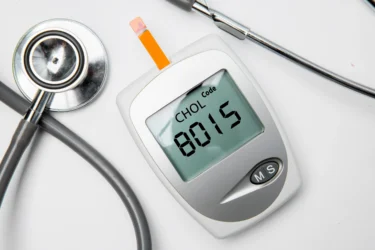
A lipid panel is a test which is done to measure cholesterol in the blood. Literature studies show that the practice of yoga asanas may positively impact lipid panels. Marian et al. in 2016, conducted a study4, the findings of which showed that the practice of yoga asanas like parivrtta parsvakonasana may help in increasing good cholesterol and decreasing bad cholesterol. Thus, the practice of parivrtta parsvakonasana may positively impact lipid panel, but the practice of this asana should not be considered an alternative to modern medicine. So, consult your doctor for proper treatment and do not rely on this asana alone. Additionally, one should practise parivrtta parsvakonasana under the supervision of a qualified trainer.

Literature studies show that the practice of yoga may have a positive impact on anxiety. Street et al. 2020 conducted a study6, the results showed that the ashtanga yogasanas like parivrtta parsvakonasana may help in managing anxiety, improving sleep quality and may help in reducing stress. Thus, there is a potential that this asana may positively impact anxiety. However, it is recommended not to rely on this asana alone and consult a doctor for proper treatment. Additionally, it is best to practice this asana under the supervision of a qualified trainer.

Gastric function includes the initiation of digestion of food by secretion of gastric acid or gastric juices; the undigested food is then removed from the body in the form of urine. Literature studies3 show that the practice of yoga asanas may have a positive impact on gastric function. B.K.S. Iyengar in his book “Light on Yoga”, has stated that the practice of parivrtta parsvakonasana asana may help in contracting and improving blood circulation to the abdominal organs and help improve digestion. It may also help in managing acidity and help remove the waste matter via the colon without straining. This indicates that the practice of parivrtta parsvakonasana may improve gastric function, but you should not consider this asana as an alternative to modern medicine. It is advised to consult your doctor for proper management of any gastric function abnormality. Also, you should practice this asana strictly under the guidance of a qualified trainer.

Note- The benefits mentioned above of parivrtta parsvakonasana are studied in a limited human population. To ascertain these claims in humans, more studies are required.
Although the practice of Yoga may help in the development of the mind and body, however, you should not consider yoga as an alternative to modern medicine. It is advised not to rely on Yoga alone to treat any condition. Kindly consult a qualified doctor for proper treatment. Additionally, any asana practice should be done under the supervision of a qualified trainer.
Also Read: Benefits of Utthita Trikonasana (Extended Triangle Pose) and How to Do it By Dr. Ankit Sankhe
While performing parivrtta parsvakonasana, caution needs to be taken in:
Following are the contraindications of parivrtta parsvakonasana:
Also Read: Benefits of Kurmasana (Tortoise Pose) and How to Do it by Dr. Himani Bisht
Parivrtta parsvakonasana is a standing asana coupled with a spinal twist, in which one leg is stretched straight and the upper body is twisted, giving an intense stretch. The name comes from the Sanskrit words “parivrtta”, which means turned round or revolved; “parsva” which means side, “kona”, which means angle, and “asana”, meaning yoga pose or posture. This translates to a revolving lateral angle pose in English. The practice of this asana may have a positive impact on arthritis, fitness, lipid panel, acidity and anxiety.
Also Read: Benefits of Baddha Padmasana (Bound Lotus Pose) and How to Do it By Dr. Himani Bisht
Parivrtta parsvakonasana is known as the revolved lateral angle pose in yoga.
Parivrtta parsvakonasana targets the Manipura chakra, which is known to control energy in the body.
Parivrtta parsvakonasana is a standing asana coupled with a spinal twist. It is a variation of parsvakonasana and is part of Iyengar yoga and ashtanga yoga.
There is limited information regarding the safety of parivrtta parsvakonasana in pregnancy. It is therefore advised to consult your doctor for proper guidance.
No, there are no studies which support the practice of parivrtta parsvakonasana on hair growth. Therefore, you should not rely on this asana alone and consult your doctor for proper treatment of hair loss.
1. Consulate General of India, Birmingham. Yoga: Origin, History And Development [Internet]. Birmingham: Consulate General of India Birmingham; 2015 Apr 25 [cited 2026 Jan 14]. Available from: https://cgibirmingham.gov.in/headline/display/11
2. Karuna Yoga Vidya Peetham. parivrtta Parsvakonasana – Revolved Side Angle Pose [Internet]. Slideshare; [cited 2026 Jan 14]. Available from: https://www.slideshare.net/slideshow/prevolved-side-angle-posepptx/261246509
3. Live With Yoga. Therapeutic Yoga for Arthritis [Internet]. Jaipur (IN): Live With Yoga; [cited 2026 Jan 14]. Available from: https://livewithyoga.org/yoga-for-arthritis/
4. Papp ME, Lindfors P, Nygren-Bonnier M, Gullstrand L, Wändell PE. Effects of High-Intensity Hatha Yoga on Cardiovascular Fitness, Adipocytokines, and Apolipoproteins in Healthy Students: A Randomized Controlled Study. J Altern Complement Med. 2016 Jan;22(1):81-7. doi: 10.1089/acm.2015.0082. Epub 2015 Nov 13. Erratum in: J Altern Complement Med. 2017 May;23(5):396. doi: 10.1089/acm.2015.0082.correx. PMID: 26565690; PMCID: PMC4739349. Available from: https://pmc.ncbi.nlm.nih.gov/articles/PMC4739349/
5. Ghazvineh D, Daneshvar M, Basirat V, Daneshzad E. The Effect of Yoga on the Lipid Profile: A Systematic Review and Meta-Analysis of Randomized Clinical Trials. Front Nutr. 2022 Jul 14;9:942702. doi: 10.3389/fnut.2022.942702. PMID: 35911119; PMCID: PMC9329825. Available from: https://pmc.ncbi.nlm.nih.gov/articles/PMC4739349/
6. Aakash. The impact of Ashtanga yoga on stress management and mental well-being: A systematic review of recent evidence. J Sports Sci Nutr [Internet]. 2024;5(2):95–104 [cited 2026 Jan 14]. Available from: https://www.researchgate.net/publication/399648445_The_impact_of_Ashtanga_yoga_on_stress_management_and_mental_well-being_A_systematic_review_of_recent_evidence_Aakash
7. Khedikar SG, Erande MP. Management of diabetes mellitus through aasana and pranayama. Int J Curr Med Pharm Res [Internet]. 2018 Sep 28 [cited 2026 Jan 14];4(9A):3656-60. Available from: https://www.researchgate.net/profile/Sachin-Khedikar/publication/328305138_MANAGEMENT_OF_DIABETES_MELLITUS_THROUGH_AASANA_AND_PRANAYAMA/links/5bc56bfe458515f7d9bf2675/MANAGEMENT-OF-DIABETES-MELLITUS-THROUGH-AASANA-AND-PRANAYAMA.pdf
8. Fishman LM. Yoga vs. Osteoporosis and Scoliosis: Series 1 with Scoliosis Session [Internet]. Manhattan (NY): Manhattan Physical Medicine and Rehabilitation; 2022 Dec 20 [cited 2026 Jan 14]. Available from: https://ipivot-now.com/wp-content/uploads/2023/01/2022-Final-OST-Manual-Ser-1-with-Scoliosis-Dec-20-2022.pdf
Disclaimer: The information provided here is for educational/awareness purposes only and is not intended to be a substitute for medical treatment by a healthcare professional and should not be relied upon to diagnose or treat any medical condition. The reader should consult a registered medical practitioner to determine the appropriateness of the information and before consuming any medication. PharmEasy does not provide any guarantee or warranty (express or implied) regarding the accuracy, adequacy, completeness, legality, reliability or usefulness of the information; and disclaims any liability arising thereof.
Links and product recommendations in the information provided here are advertisements of third-party products available on the website. PharmEasy does not make any representation on the accuracy or suitability of such products/services. Advertisements do not influence the editorial decisions or content. The information in this blog is subject to change without notice. The authors and administrators reserve the right to modify, add, or remove content without notification. It is your responsibility to review this disclaimer regularly for any changes.
Yoga is an age old method of asanas (poses or postures) and pranayamas (breathing techniques). This yoga offers physical and mental benefits for all age groups. Yoga finds root in the Sanskrit word “Yuj” meaning union or to join. Mind body fitness involves muscular activity and a focus on awareness of self, energy, and breathing. Yoga is more like an art than a restricted workout routine, which believes that healing comes from within. Regular yoga training may help you feel better from head to toe. This section will highlight one asana called Konasana1,2. Let us discuss the Konasana and its health benefits.
Konasana is also known as the sideway bending pose or the angle pose yoga. The word is derived from the Sanskrit words “Kona” meaning angle, and “asana” meaning pose or posture, translating to the angle pose in English. This posture has two variations, Konasana I and Konasana II both involve sideways stretching using both hands3.
Konasana must be done properly for maximum health benefits. One may perform Konasana in the following manner:
Did you know?
Konasana benefits are as follows:

Diabetes (Type I and Type II) is a metabolic disorder or issue characterized by elevated blood glucose levels due to reduced synthesis or resistance of a hormone called insulin which regulates blood glucose. A study by Mahapure et al. in 2015 stated that yogasanas like Konasana might help reduce blood glucose levels. It is assumed that a side stretch during Konasana may result in alternate abdominal contractions and relaxations, which may result in increased secretion of insulin (the hormone that regulates blood glucose). Additionally, Konasana may help reduce oxidative stress, which is important in diabetic complications. This indicates that Konasana may help in managing diabetes. However, this asana should not be considered an alternative to modern medicine. Kindly consult a doctor for proper treatment. Additionally it is advised to exercise this asana under the supervision of a qualified trainer4.
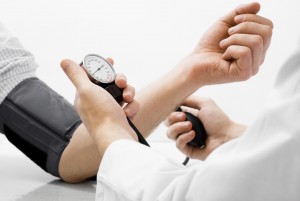
Hypertension or high blood pressure has no noticeable symptoms, but if left untreated, it may become a risk factor for many other diseases. Lack of exercise and inactivity can lead to hypertension. Yoga may reduce high blood pressure. Along with pranayamas (breathing techniques), a few selected yogasanas, like Konasana, are prescribed for managing hypertension. Thus asanas like Konasana may positively impact blood pressure, but this asana should not be considered an alternative to modern medicine. Kindly consult your doctor for the proper treatment of hypertension. Additionally, it is recommended to perform this asana under the supervision of a qualified trainer5.
According to what I’ve observed, regular practice of Konasana might support clearer and healthier skin. It may help with frequent boils and managing pimples on the skin6.
Dr. Siddharth Gupta, B.A.M.S, M.D (Ayu)
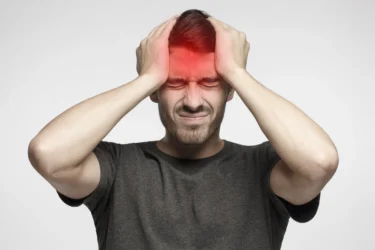
A brain attack damages the brain due to the blockage of the blood supply. It has been found that the Konasana may improve blood circulation to the brain and help manage and may reduce the risk of stroke. The Health Ministry of India approves the Konasana and its potential for preventing stroke. This indicates that the Konasana may positively impact stroke. However, it is recommended not to rely on this asana alone and consult a doctor for proper stroke treatment. Additionally, one should perform this asana under the guidance of a qualified trainer3,5.

Regularly performing different yogasanas and pranayamas may help in reducing the symptoms of depression. Asanas like Konasana are approved by the Ministry of health and Family Welfare, India, for managing depression. Thus, the Konasana may help in alleviating depressive symptoms. However, it is advised to consult a doctor for proper treatment of depression and not rely on this asana alone. Additionally, one should perform this asana under the supervision of a qualified trainer5.

Obesity is the accumulation of more body fat which may increase the risk of several diseases. It is now evident that regular yoga (Konasana) may positively impact obesity by reducing body weight and excess body fat. The Ministry of Health and Family Welfare approved the Konasana for managing obesity. However, one should not consider this asana an alternative to modern medicine. Kindly consult your doctor for proper treatment. Additionally, it is recommended to exercise this asana under the supervision of a qualified trainer5.

Asanas like Konasana is approved by the Ministry of Health and Family Welfare, India, for managing asthma. This sideway stretch may help in opening chest muscles and improving breathing. Thus, the Konasana may positively impact asthma. It may not help in clinically treating asthma but may provide symptomatic relief. However, it is advised to consult a doctor for proper treatment of asthma and not rely on this asana alone. Additionally, one should follow this asana under the supervision of a qualified trainer5.
Also Read: Benefits of Sarpasana (Snake Pose) and How to Do it By Dr. Himani Bisht

The above-mentioned benefits of Konasana are not yet proven in any human study and are based on a literature search.
Yoga exercise may help develop the mind and body it is not an alternative to modern medicine or treatment. You Should not rely on Yoga alone to treat any condition. Instead, please consult a qualified doctor who can assess your condition and advise accordingly. However, it is necessary to perform and learn Yoga under the supervision of a yoga master to avoid any injuries.
In my view, Konasana may have potential benefits for increasing height. By practising this yoga asana, you engage in a deep side stretch and twist, which may enhance overall body flexibility and alignment. However, it’s important to note that individual results may vary, and maintaining a healthy lifestyle with proper nutrition is essential for optimal growth and development6.
Dr. Smita Barode, B.A.M.S, M.S.
Also Read: Benefits of Shashankasana (Rabbit Pose) and How to Do it By Dr. Himani Bisht
Conditions, and contraindications of Konasana, include3:
It is advised to perform Konasana under the guidance of a qualified trainer. Additionally, this asana should not be considered a substitute for modern medicine.
I may provide you with a beneficial tip. Practising Konasana slowly and mindfully may offer relief from sciatica. However, always remember to listen to your body and consult a healthcare professional if needed6.
Dr. Rajeev Singh, BAMS
Konasana yoga is also known as the sideway bending pose or the angle pose yoga. The word is derived from the Sanskrit words “Kona” meaning angle, and “asana” meaning pose or posture, translating to the angle pose in English. This asana may positively impact diabetes, asthma, hypertension, obesity, stroke, and depression. Additionally, Konasana may help tone and strengthen side muscles, improve digestion, and relieve constipation and back pain.
Also Read: Benefits of Vakrasana (Spinal Twist Pose) and How to Do it By Dr. Himani Bisht
Konasana is also known as the sideway bending pose or the angle pose. The word is derived from the Sanskrit words “Kona” meaning angle, and “asana” meaning pose or posture, translating to the angle pose in English3.
Konasana yoga has two variations, Konasana I and Konasana II; both involve sideways stretching using both hands3.
First, roll out a mat and stand in Tadasana. Ensure your body is aligned from head to toe, your feet are placed at shoulder level, and your neck is straight. Take a deep breath and proceed. Next, slowly raise your right arm over the head, up in the sky, and bend your upper body to the right meanwhile, the left hand will be placed sideways, touching the left thigh. Keep the legs and hips fixed only curve the spine sideways, giving it a side stretch. Continue to hold this position for six seconds. Next, exhale and return to the original position. Repeat the above steps with the left arm. This sequence completes one round of Konasana3.
Regular training in this asana may help in reducing diabetes, hypertension, asthma, stroke, and depression and managing obesity. Further, this asana may help strengthen the side muscles, relieve constipation, and improve digestion4,5.
People with hypertension and other cardiac complaints, spinal or neck injuries, and pregnant women should avoid doing this asana3.
Disclaimer: The information provided here is for educational/awareness purposes only and is not intended to be a substitute for medical treatment by a healthcare professional and should not be relied upon to diagnose or treat any medical condition. The reader should consult a registered medical practitioner to determine the appropriateness of the information before consuming any medication. PharmEasy does not provide any guarantee or warranty (express or implied) regarding the accuracy, adequacy, completeness, legality, reliability, or usefulness of the information; and disclaims any liability arising thereof.
Links and product recommendations in the information provided here are advertisements of third-party products available on the website. PharmEasy does not make any representation of the accuracy or suitability of such products/services. Advertisements do not influence the editorial decisions or content. The information in this blog is subject to change without notice. The authors and administrators reserve the right to modify, add, or remove content without notification. It is your responsibility to review this disclaimer regularly for any changes.
Although, it is rightly said that ‘don’t judge a book by its cover’, it’s difficult not to be moved by the glowing face of a person. Beauty is just a higher form of health and healthy-looking skin is always considered beautiful. The basic aim of “Swasthavritta” is to keep a healthy person well by preventing sickness. Kumkumadi tailam, an ancient recipe, includes rare ayurvedic ingredients. High-quality saffron oil is called kumkumadi tailam. This special combination of oils and kumkumadi tailam promotes youthful and healthy-looking skin. Kumkumadi tailam might help to heal uneven skin, brighten skin and add radiance1.
Friendly Reminder: The information shared here is for educational purposes only and the reader should consult a registered medical practitioner before implementing any changes to their health routine.
The kumkumadi tailam is made of ingredients mixed in equal amounts (48gms each) given below2:
Other ingredients used are goat milk, sesame oil, Kesar and rose water Q.S.(quantity sufficient). These ingredients are mixed to finally obtain the ayurvedic preparation called kumkumadi tailam.
The potential properties of kumkumadi tailam are:
Some of the potential uses of kumkumadi tailam are discussed as follows.

When kumkumadi tailam is applied locally to the lips, it helps to dilate the blood vessels at the affected lip region. As a result, the active ingredient in the herb may easily penetrate the skin and enter the bloodstream through the capillaries at the affected lip areas1.
Nitin Jathar et al. (2020) conducted a study3 on 30 patients suffering from discoloured lips due to smoking. They were treated with kumkumadi tailam by applying it locally. This demonstrated improvement in the lip colour significantly. Since the primary dosha that may cause lip discolouration might be pitta, kumkumadi tailam might improve lip colour by relieving pitta1. This may indicate the potential of kumkumadi tailam in helping in improving lip discolouration. However, there is a need for more studies in this area. You must consult an Ayurvedic physician to understand the exact benefits of the herb for humans.
Let me tell you about the wonders of kumkumadi tailam. This magical oil can work wonders for your skin! It may act on the inflammation in the top layer of your skin, known as the epidermis. It has chemicals that may change how your skin cells called melanocytes and immune cells behave. By doing so, it might help lighten dark spots and hyperpigmentation2.
Dr. Smita Barode, B.A.M.S, M.S.
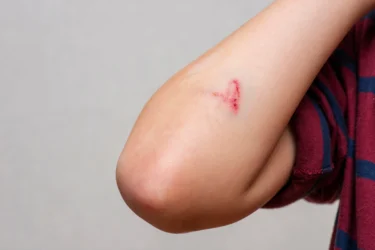
Many herbs present in the herbal preparation of kumkumadi tailam might have wound-healing properties and anti-inflammatory, antiviral and antibacterial characteristics. Combining these herbs might help stop bleeding in wounds and injuries, heal skin ulcers and expedite the regeneration of the tissue in wounds2. These benefits of this herb in the formulation need to be further evaluated by studies. You must consult a doctor before using any herb for its medicinal benefits.

Antioxidant, anti-inflammatory and anti-hyperpigmentation properties might be present in kumkumadi tailam. The formulation might also exhibit anti-ageing, skin hydration, anti-wrinkle, moisturising benefits and potential improvement in skin texture. Thus, using kumkumadi oil for the face can brighten skin, increase skin softness and decreases pigmentation making the skin radiant. It might also decrease the amount of melanin pigment released. Moreover, it may improve skin lustre while reducing the appearance of scars, dark circles under the eyes and hyperpigmentation1,2.
In my opinion, in addition to its potential benefits of kumkumadi tailam for dark spots and hyperpigmentation. It may also help help those struggling with patchy skin. This Ayurvedic formulation may help manage dryness and improve overall skin texture3.
Dr. Rajeev Singh, BAMS

One of the major kumkumadi oil ingredients is saffron. Golmohammadzadeh et al. (2010) studied4 that saffron present in kumkumadi tailam might have properties that can be used as a natural UV-absorbing agent. Thus, it might be used as sunscreen.
On regular applications, kumkumadi tailam may also remove the damage caused by prolonged sun exposure like sun tan, blemishes, dark spots, etc. However, the studies conducted on the exact benefits of this formulation are insufficient to prove its benefits. It is better to get professional advice from qualified doctors2.

Several other potential uses of kumkumadi tailam need to be studied further to prove its exact efficacy. Some of these are:
Though there are studies showing the kumkumadi tailam benefits in various conditions, these are insufficient and there is a need of further studies to establish the true extent of kumkumadi tailam on human health.
I would suggest giving kumkumadi tailam a try if you’re looking for a natural solution for acne. This ayurvedic product might be beneficial for certain skin disorders, specifically acne5.
Dr. Siddharth Gupta, B.A.M.S, M.D (Ayu)
To obtain kumkumadi tailam benefits for the skin, you may take some amount of the oil on your palms, and then gently rub it all over the skin regularly for clear and radiant skin. You may gently apply it on affected areas like lips using your fingers for targeted benefits. It is best to apply it before bedtime1,2.
You must consult a qualified doctor before taking any kumkumadi tailam supplements. Do not discontinue or replace an ongoing modern medical treatment with an ayurvedic/kumkumadi tailam preparation without consulting a qualified doctor.
Kumkumadi tailam is generally considered safe if used in the recommended dosages. Further, the local application of kumkumadi tailam on lips might not cause side effects such as allergic reactions, itching, etc. However, ayurvedic kumkumadi oil side effects cannot be completely denied as herbs may react differently in each person’s skin depending on their condition and body responses. Therefore, you must consult a qualified Ayurvedic doctor before using any herb for medicinal purposes2.
Also Read: Cardamom (Elaichi): Uses, Benefits, Side Effects and More!
Just like any remedy or treatment, general precautions need to be followed while using kumkumadi tailam. People should take extra precautions before giving them to children, the elderly and pregnant and lactating women. Please do not try to self-medicate with herbs. Ayurvedic herbs may have potential benefits, but it is advisable to consult a qualified Ayurvedic physician before their usage.
Also Read: Kalmegh: Uses, Benefits, Side Effects, Precautions & More!
The possibility of certain drugs reacting with herbs like kumkumadi tailam cannot be denied. Therefore, you must consult an Ayurvedic physician before using any herbal item in more than the prescribed quantities. Your Ayurvedic physician can appropriately modify the dosage and prescribe as per your current medications, conditions and requirements.
Also Read: Kodo Millets: Uses, Benefits, Side Effects, And More
Several Ayurvedic ingredients are mixed together to make the formulation called kumkumadi tailam. A few major ingredients of the kumkumadi oil are: Kumkuma, Usheera, Kaaleeya, Laksha, Yashtimadhu, Chandana, Nyagrodha, Padmaka, Neelotpala, Manjishta, etc1.
To prepare kumkumadi tailam, we first need to prepare a coarse powder of all herbs and soak them in water for a few hours. Further, a kwatha can be prepared by boiling this water with herbs until it is reduced to 1/4th of its volume. Then, this decoction can be filtered. Then you can prepare a herbal paste using herbs like Manjistha, Yashtimadhu, Mahua, Lac and Pattanga. Finally, this herbal paste, sesame oil and goat milk are mixed in a vessel, the mixture is boiled and simmered until the oil remains. Once this oil is taken out, we can mix a paste of saffron with rose water into this oil and preserve it in a glass bottle. This final preparation is called kumkumadi tailam2.
If consumed in the proper dosages, kumkumadi tailam is usually regarded as safe. Furthermore, patients may not have any negative side effects from the local application of kumkumadi tailam to their lips, such as allergic reactions, irritation, etc. It is better to consult your ayurvedic physician before using any herb for medicinal purposes.
Kumkumadi tailam might have properties that can be used as a natural UV-absorbing agent. It may also reverse sun damage to some extent. However, these properties have yet to be studied extensively. It would be best if you took advice from a qualified doctor before using it.
The herbs that combine to form kumkumadi tailam may be effective against bacteria, viruses and generalized inflammation in addition to healing of wounds. Combining these herbs may speed up the process of regeneration of wound tissue, stop untimely bleeding in wounds and heal skin ulcers. However, more studies should be conducted to better assess the advantages of using this herb in the formulation. Before utilising any herb for its therapeutic properties, you must visit a doctor.
Disclaimer: The information provided here is for educational/awareness purposes only and is not intended to be a substitute for medical treatment by a healthcare professional and should not be relied upon to diagnose or treat any medical condition. The reader should consult a registered medical practitioner to determine the appropriateness of the information and before consuming any medication. PharmEasy does not provide any guarantee or warranty (express or implied) regarding the accuracy, adequacy, completeness, legality, reliability or usefulness of the information; and disclaims any liability arising thereof.
Links and product recommendations in the information provided here are advertisements of third-party products available on the website. PharmEasy does not make any representation on the accuracy or suitability of such products/services. Advertisements do not influence the editorial decisions or content. The information in this blog is subject to change without notice. The authors and administrators reserve the right to modify, add, or remove content without notification. It is your responsibility to review this disclaimer regularly for any changes.
Kale, also called “the queen of vegetables”, has received celebrity status by appearing on the menus of Michelin-star restaurants. In addition, it has become the favourite ingredient of many millennial food bloggers. Brassica oleracea or kale is a cruciferous winter vegetable available in different varieties like curly kale, dinosaur kale (lacinato kale), and Russian kale, also called Siberian kale. Curly kale is the most common of all; the leaves of kale look like ruffles, are purple or deep red and have a pungent taste. Originating in the 16th century in North America and later spreading to Canada and the U.S. In India, the cultivation of kale is limited to Jammu and Kashmir, Himachal Pradesh and the Nilgiri hills. Kale is one of the healthiest foods, the perks of which have been mentioned in several books by Greek physicians and botanists. There are several reasons to add this vegetable to your diet. Let us find out more about the benefits of kale1.
Did you know?
Kale is a nutritional powerhouse; it is packed with the goodness of fibres, minerals and antioxidants like zeaxanthin and lutein, folate, tocopherols and other phytoconstituents like nitrates, sulforaphane, insole-3-carbinol, etc. The nutritional components of kale are mentioned in the table below.
The consumption of kale shows numerous scientifically proven properties; some of these properties are mentioned below:
Some of the potential benefits of kale are described as follows:

Literature suggests that consuming green leafy vegetables may have a protective effect towards cognitive decline. Morris et al. conducted a study3 in 2018 to assess the effect of the consumption of green leafy vegetables like kale on cognition. This study showed that kale consumption might help slow down age-related cognitive decline due to bioactive phytochemicals like lutein, folate, nitrate, tocopherols, etc. This indicates that the consumption of kale may have a positive impact on cognition. However, we need more studies to support these claims.

Royston et al. conducted a literature review in 2015 to assess the impact of cruciferous vegetables on cancer prevention4. The findings of this review conclude that cruciferous vegetables like kale contain chemical components like insole-3-carbinol (I3C), sulforaphane (SFN) which are regulators of microRNAs (miRNAs) and inhibitors of DNA methyltransferases (DNMTs) and histone deacetylases (HDACs) and may be helpful in chemoprevention. This indicates that the consumption of kale may positively impact chemoprevention. However, we need more studies to support these claims.
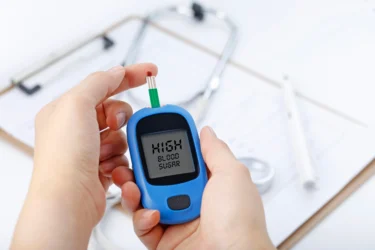
Scientific studies have supported vegetarian diets, especially green leafy vegetables, for glycemic control. Sumio et al. conducted a study5 in 2016 to assess the effect of kale intake on plasma glucose. This study’s findings showed that kale intake might help suppress blood glucose levels. This indicates that kale consumption may help manage blood glucose levels. However, we need more studies to support these claims.

Literature states that cruciferous vegetables like kale have a positive impact on the composition and health of gut microbiota (microorganisms in the gut). Shahinozzaman et al. conducted a study6 in 2021 to assess the impact of kale supplementation on gut health in mice. This study’s findings suggest that kale consumption may help improve gut microbial composition, bacterial microbial functions and, thus, gut health. This indicates that the consumption of kale may have a positive impact on gut health. However, there are no studies conducted on humans to support these claims.

Hypercholesterolemia is defined as an increase in total cholesterol, an increase in LDL (low-density lipoprotein) and a reduction in HDL (high-density lipoprotein). Consumption of kale exerts a hypo-cholesterolaemic effect by HMG-CoA inhibition, the enzyme responsible for cholesterol synthesis. To evaluate the effect of kale supplementation in diet on lipid profile, Yeon et al. conducted a study7 in 2008 on hypercholesterolemia. The findings of this study showed that kale supplementation helped increase high-density lipoprotein or good cholesterol and decreased low-density lipoprotein or bad cholesterol. This indicates that the consumption of kale may have a favourable impact on lipid profile by inhibiting HMG-CoA. However, we need more studies to ascertain these claims.

Though there are studies that show the benefits of kale in various conditions, these are insufficient, and there is a need for further studies to establish the true extent of the benefits of kale on human health.
I personally believe that kale is only nutritious but may also support your efforts to maintain a healthy weight. This leafy green vegetable is low in calories and high in fibre and protein. A mere two cups (500 mL) of raw kale have fewer than 50 calories and 4.5g of protein and fibre. This means you might enjoy a satisfying portion of kale without consuming excessive calories, making it a great choice for those looking to manage their weight while nourishing their bodies8.
Dr. Siddharth Gupta, B.A.M.S, M.D (Ayu)
You must consult a qualified doctor before taking any herbal supplements. Do not discontinue or replace an ongoing treatment of modern medicine with an ayurvedic/herbal preparation without consulting a qualified doctor.
In light of what I’ve observed, incorporating kale into your diet might be a tasty way to potentially safeguard against certain health issues. Kale might be effective in binding bile acids in the body. This unique property of kale may contribute to reducing the risk of premature degenerative diseases. By helping to bind bile acids, kale may have a positive impact on your health, potentially lowering the risk of certain conditions9.
Dr. Rajeev Singh, BAMS
A study7 conducted by Alfawaz et al. in 2021 emphasized the following facts:
However, if you experience any adverse reactions to kale, it is advised to discontinue its intake and immediately contact a doctor or your Ayurvedic physician who has prescribed it. They will be able to guide you appropriately for your symptoms.
Judging from what I’ve witnessed, kale is a surprising vegetable that is packed with vitamin C. In fact, it might have a higher concentration of vitamin C compared to other salad vegetables and even vegetables from the Brassicaceae family. It might be considered one of the best sources of vitamin C and may meet the recommended daily allowance (RDA) for both males and females10.
Dr. Smita Barode, B.A.M.S, M.S.
Eating kale is okay if taken in moderate amounts. However, general precautions must be followed in the following conditions:
Also Read: Soybean: Uses, Benefits, Side Effects By Dr. Rajeev Singh
There is no significant interaction of kale with other drugs. However, you must always seek the advice of your Ayurvedic physician about the possible interaction of kale with other drugs and follow the prescription thoroughly, as they will know your health condition and other medications you are taking.
Also Read: Lettuce (Salad Patta): Uses, Benefits, Side Effects By Dr. Rajeev Singh
The scientific name of kale is Brassica oleracea1.
Yes. Kale contains low levels of carbohydrates, is rich in fiber and may help in promoting weight loss. However, scientific evidence to support this claim is limited. Therefore, you should consult a doctor if you have any weight-related issues.
Yes, kale may help manage diabetes as they have the potential to reduce elevated blood glucose. However, further studies are needed to support these claims. Therefore, it is advised to consult a doctor for the proper treatment of diabetes3.
Kale is known as “the queen of vegetables”1.
Consumption of kale in excess can increase the risk of kidney stones, and iodine deficiency and can trigger an allergic reaction in allergy-prone individuals.
Disclaimer: The information provided here is for educational/awareness purposes only and is not intended to be a substitute for medical treatment by a healthcare professional and should not be relied upon to diagnose or treat any medical condition. The reader should consult a registered medical practitioner to determine the appropriateness of the information and before consuming any medication. PharmEasy does not provide any guarantee or warranty (express or implied) regarding the accuracy, adequacy, completeness, legality, reliability or usefulness of the information; and disclaims any liability arising thereof.
Links and product recommendations in the information provided here are advertisements of third-party products available on the website. PharmEasy does not make any representation on the accuracy or suitability of such products/services. Advertisements do not influence the editorial decisions or content. The information in this blog is subject to change without notice. The authors and administrators reserve the right to modify, add, or remove content without notification. It is your responsibility to review this disclaimer regularly for any changes.
Nothing feels more satisfying than tasting a batch of fresh grapes! These are not only important for curating a quality wine but are also used in refreshing fruit bowls and dishing out sinful desserts. It is because of this versatility, that grapes are also called as “Queen of fruits”. The scientific name of grapes is Vitis vinifera and it belongs to the family Vitaceae. Grapes are crunchy and juicy shots of heaven in various colours like black, green and red. They can be with or without seeds. About 8000 years ago, the cultivation of grapes began in the Middle East. They are now widely grown in Africa, Southern Europe, North and South America and Australia, India ranks among the top ten countries in the production of grapes. In India, 80% production is done in Maharashtra, Karnataka and Tamil Nadu. They are not only tasty but have several health benefits. Let us read about some evidence-based benefits which will tempt you to add grapes to your diet1,2.
Did you know?
Grapes are richly packed with various nutritional components that are given as follows3:
Grapes show numerous scientifically proven properties and some of these properties are mentioned below4:
Some of the potential benefits of grapes are described as follows:

Studies support the association of grapes with an improvement in cognitive function. Grapes contain antioxidants like resveratrol which have anti-inflammatory and antioxidant properties which may help inhibit neurodegeneration. It also increases blood flow to the brain, and along with the presence of minerals like manganese, potassium and calcium, may improve brain health. Lee et al. conducted a study5 in 2017 to assess the effect of grape consumption on cognitive function. The study was conducted on ten participants with mild cognitive decline; this study showed a positive effect of grapes on cognitive function. Thus, grapes may have a positive impact on cognitive function. However, more studies are needed to support these claims.
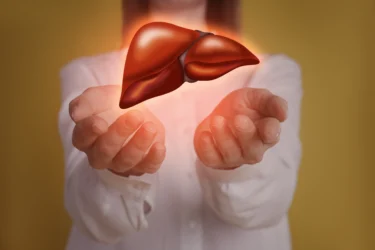
Literature reviews suggest that grapes contain phytochemical resveratrol, which may have hepatoprotective effects against cholestatic, chemical and alcohol-mediated damage. Asim et al. conducted a study6 in 2022 to assess the effect of the consumption of grapes on non-alcoholic fatty liver disease in mice. This study showed that grapes helped modulate hepatic gene expression, preventing oxidative damage and ameliorating NAFLD. This indicates that the consumption of grapes may help manage NAFLD. Additionally, resveratrol may help reduce liver fibrosis and steatosis, which are features of chronic liver disease and thus, may exert a hepato-protective effect. However, scientific evidence to support these claims is limited, and we need more studies to support these claims.

Polyphenol-rich food may have a favourable effect on lipid profile. Roberta et al. conducted a meta-analysis in 2020 to assess the impact of grapes on lipid profile7. This meta-analysis showed that grapes’ consumption significantly reduced low-density lipoprotein (LDL) or bad cholesterol and increased high-density lipoprotein (HDL) or good cholesterol. This reduction in LDL cholesterol is attributed to the presence of polyphenols like resveratrol in grapes. Therefore, the consumption of grapes may help in reducing bad cholesterol and increasing good cholesterol. However, we need more scientific evidence to support these claims.
Did you know that adding grapes to your diet can be a secret weapon for youthful aging? These amazing fruits are packed with antioxidants that work their magic inside your cells, fighting off harmful oxidative stress and kickstarting the production of a powerful antioxidant called glutathione10.
Dr. Rajeev Singh, BAMS

Type II diabetes mellitus is a global public health challenge affecting the majority of the population. It is characterized by an increased glucose production by the liver due to insulin resistance and beta-cell defects. Grapes have a low glycemic index, which may positively impact type II diabetes mellitus. Zunino et al. conducted a literature review in 2009 to assess the effect of grapes on type II diabetes8. The review suggested that grapes may have the potential to reduce elevated blood glucose, improve beta cell function and protect against beta cell loss due to the presence of numerous polyphenols like resveratrol, catechins, anthocyanins, etc. The results of this study indicate that grapes may exert a positive impact on type II diabetes. Additionally, the presence of resveratrol may help in managing diabetic neuropathy. However, we need more research to support these claims.

Several literature studies support the use of grapes as promising anticancer agents due to the presence of antioxidants. Zhou et al. conducted an in-vitro study9 in 2012 to assess the effect of grapefruit on small lung cancers. The results of this study supported the use of grapes for managing cancer. The anti-cancerous activity is attributed to the presence of antioxidants like proanthocyanidins which show inhibitory effects on several cancers. So, it might be possible that grapes can help in dealing with cancer. However, this finding needs further research to be applied practically.

Though there are studies that show the benefits of grapes in various conditions, these are insufficient and there is a need for further studies to establish the true extent of the benefits of Grapes on human health.
Including grapes in your diet might have a positive impact on retinal health. The antioxidants present in grapes may help protect and preserve the structure and function of the photoreceptors in the retina, promoting better vision and avoiding further damage11.
Dr. Siddharth Gupta, B.A.M.S, M.D (Ayu)
You can incorporate grapes into your dietary routine in the form of fresh, frozen or as juice2.
You must consult a qualified doctor before including grapes in your diet. Do not discontinue or replace an ongoing treatment of modern medicine with grapes without consulting a qualified doctor.
Data regarding the side effects of grapes is limited and more research is required to verify the side effects of grapes on human health. However, if you experience any adverse reactions to grapes, it is advised to discontinue its intake and immediately contact a doctor or your Ayurvedic physician who has prescribed it. They will be able to guide you appropriately for your symptoms.
Also Read: Grapefruit (Chakotra): Uses, Benefits, Side Effects and More!
Eating grapes is okay if taken in moderate amounts. However, general precautions must be followed in the following conditions:
Also Read: Durian: Uses, Benefits, Side Effects By Dr. Rajeev Singh
Grapes (Angur) are known to interact with several drugs resulting in untoward effects. Drugs known to interact adversely with grapes are mentioned below; given with them are the conditions wherein they are advised.
These interactions can result in unwanted effects on the body and may reduce the drug’s efficacy. However, you must always seek the advice of your Ayurvedic physician about the possible interaction of grapes with other drugs and follow the prescription thoroughly, as they will know your health condition and other medications you are taking.
Also Read: Buffalo Milk: Uses, Benefits, Side Effects By Dr. Rajeev Singh
The scientific name of grapes is Vitis vinifera1.
Grapes are known as “queen of fruits”1.
Yes, grapes may help manage diabetes as they have a low glycemic index. However, more studies need to be done to support these claims in humans. Therefore, it is advised to consult a doctor for proper treatment.
The presence of melatonin in grapes may help manage insomnia. The scientific evidence supporting these claims is limited and therefore, it is advised to consult a doctor if you have any sleep-related issues.
Data regarding the side effect profile of grapes is limited, and more research is required to verify the side effects of grapes on human health. However, if you experience any adverse reactions to grapes, it is advised to discontinue its intake and immediately contact a doctor or your Ayurvedic physician who has prescribed it. They will be able to guide you appropriately considering your symptoms.
Disclaimer: The information provided here is for educational/awareness purposes only and is not intended to be a substitute for medical treatment by a healthcare professional and should not be relied upon to diagnose or treat any medical condition. The reader should consult a registered medical practitioner to determine the appropriateness of the information and before consuming any medication. PharmEasy does not provide any guarantee or warranty (express or implied) regarding the accuracy, adequacy, completeness, legality, reliability or usefulness of the information; and disclaims any liability arising thereof.
Links and product recommendations in the information provided here are advertisements of third-party products available on the website. PharmEasy does not make any representation on the accuracy or suitability of such products/services. Advertisements do not influence the editorial decisions or content. The information in this blog is subject to change without notice. The authors and administrators reserve the right to modify, add, or remove content without notification. It is your responsibility to review this disclaimer regularly for any changes.
When one thinks about Yoga, what comes to mind immediately is meditation (dhyan) and exercises (asanas). While yoga surely includes that, what is also present in Yoga is mudras. Mudras are hand postures which means using the fingers to make specific postures of the hand.
The science of Ayurveda believes that the human body is comprised of five natural elements (air, fire, space, earth and water) and these five elements are represented by our five fingers. It is said that if all five elements are balanced, then the body is in a state of well-being. Any imbalance in any one of these elements may lead to illness.
Our fingers are believed to be like live wires that conduct electric current through them. When we do a mudra, one or more fingers touch the thumb and an electric circuit is completed. Through this completed electric circuit, the life energy flows and helps bring about balance in the elements1,2.
Mudras are said to have many potential benefits for the holistic development of a person. One such mudra is the Gyan mudra.
The word mudra is formed by joining two Sanskrit words ‘mud’ meaning joy or happiness and ‘ra’ which means to generate or produce. It signifies that the practice of mudra produces happiness or joy. The various hand and finger movements done while practicing any mudra are believed to build essential links in the nervous system and invigorate certain energy pathways in the body.
Gyan mudra (also spelled Jnana mudra) is a powerful mudra of learning and wisdom. It has been practiced by yoga gurus striving for peace and spiritual development since ancient times. The word Jnana or Gyan means knowledge or wisdom. Gyan mudra is hence the mudra for intuitive knowledge. It is also known as the psychic gesture of consciousness1,5.
The mudras should be practiced with proper technique to obtain maximum health benefits. The steps to do Gyan mudra are as follows:
Here are some interesting facts about Gyan Mudra that make for an interesting read:
Gyan mudra is said to be a Yoga mudra with various benefits that may be helpful in maintaining good health and enhancing your spiritual level. Some of the potential benefits of Gyan mudra are:

Everyone desires a sharp mind and a great memory. Gyan mudra may improve the blood flow to the brain by bringing about metabolic changes in the body, thus increasing the nutrient flow to the brain. This may help in increasing memory and concentration. Improvement in brain activity especially memory may be seen if this mudra is practiced consistently. It may also help in maintaining the overall mental well-being of an individual2,4,6.
In light of what I’ve perceived apart from enhancing focus, Gyan Mudra is believed to boost mental power. It is thought to possibly strengthen the mind and enhance cognitive abilities, making it a beneficial practice for improving overall mental prowess9.
Dr. Siddharth Gupta, B.A.M.S, M.D (Ayu)

Gyan mudra may be beneficial to stabilize the restlessness of the mind. It may help improve the focus of a fidgety mind and help one to attain the Gyan or Jnana state, that is the state of selective wisdom. This mudra may be used in situations where one needs to focus such as for studying or contemplation8. It may be used for meditation as it helps calm a restless mind7.

Undue anxiety can cause problems in our daily life. It may also affect the way we respond to situations. People having anxiety issues may benefit from performing Gyan mudra. A study has shown that regularly practicing Gyan mudra may help reduce anxiety levels and help the person to achieve a steady mind with rational thinking. It may also help the person provide appropriate reactions to dangerous or threatening situations which are generally considered to be anxiety-inducing5. It may help heal the internal organs by alleviating symptoms of stress, tension, depression, and sleeplessness2,4.
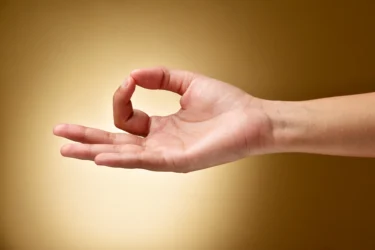
Gyan mudra may be beneficial in stimulating certain endocrine glands. It is believed that the tip of the thumb has centers corresponding to the pituitary and other glands. The pituitary gland is an important endocrine gland that secretes vital hormones. It may improve blood circulation to the pituitary gland4. When one does the Gyan mudra, the thumb tip is pressed lightly by the tip of the forefinger. This stimulates the pituitary and endocrine glands to work actively8.

While Yoga mudras may be beneficial to a person in many ways, it must not be used as an alternative to conventional modern medicine. One must not rely on it to alone to treat any health condition. If you are facing any health issues, always consult a qualified medical doctor who can examine you and advise appropriate treatment. Besides, to avoid injuries, it is necessary to learn and practice Yoga under the guidance of a trained and qualified yoga teacher.
Based on what I have noticed, Gyan Mudra might have several benefits. It may help improve breathing problems and enhance blood circulation, allowing the lungs to receive more oxygen10.
Dr. Rajeev Singh, BAMS
One must stop doing this mudra if any pain or stress is felt while doing it2. Apart from this particular risk, there are no scientific studies available to show any other risks associated with practicing Gyan mudra. Yet, it is advised to practice this mudra under the guidance of a trained and qualified Yoga expert.
Gyan mudra or Jnana mudra is a Yoga mudra that has been practised since ancient times. It is a hand posture formed by joining the tips of the index finger and thumb. It is mudra of intuitive wisdom and knowledge. It has many benefits for the nervous system and endocrine systems. It may also help in spiritual development. One must learn this mudra from a Yoga expert and practice it consistently using the correct techniques, so as to avoid injuries and gain optimum benefits.
The name Gyan mudra is derived from the Sanskrit word Jnana or Gyan meaning knowledge or wisdom. Gyan mudra is hence also known as the mudra for intuitive knowledge. Also known as the psychic gesture of consciousness, it has several health benefits for the nervous and endocrine system2,4,5,8.
Gyan mudra steps are: Sit in a comfortable position on the mat/ground. You may sit in Padmasana or Vajrasana. Keep your hands on your knees with the palms facing upwards. In each of your hands, join the tips of the index finger to the thumb and apply light pressure. Keeping the other three fingers outstretched, close your eyes and focus on your breathing. You may perform Gyan mudra for any duration between 15-30 minutes. For maximum benefit, it is advisable to practice this mudra for 24 minutes2,4.
While Gyan mudra can be done by people of all age groups2, it is advisable to practice this mudra under the guidance of a trained and experienced yoga teacher who can help you perform it without any side effects.
It is not necessary that Gyan mudra be done in sitting position only. It can also be done while walking, standing, studying, reading, praying or while watching television2.
Yes, Gyan mudra may be done even if you are undergoing any treatment for any health condition2.
Disclaimer: The information provided here is for educational/awareness purposes only and is not intended to be a substitute for medical treatment by a healthcare professional and should not be relied upon to diagnose or treat any medical condition. The reader should consult a registered medical practitioner to determine the appropriateness of the information and before consuming any medication. PharmEasy does not provide any guarantee or warranty (express or implied) regarding the accuracy, adequacy, completeness, legality, reliability or usefulness of the information; and disclaims any liability arising thereof.
Links and product recommendations in the information provided here are advertisements of third-party products available on the website. PharmEasy does not make any representation on the accuracy or suitability of such products/services. Advertisements do not influence the editorial decisions or content. The information in this blog is subject to change without notice. The authors and administrators reserve the right to modify, add, or remove content without notification. It is your responsibility to review this disclaimer regularly for any changes.
In recent days, physical fitness has become important, and people have started linking physical health with mental and spiritual health. Yoga is a form of physical exercise that helps us to integrate our body and mind. Yoga means ‘joining’ or ‘union’. There are many systems of yoga, and each system unifies various aspects of human beings in different ways. One such system is Hatha Yoga which aims to balance and join multiple energy flows in the human body. The sun salutation, or Surya namaskar, is a part of hatha yoga involving various poses (asanas). One such asana used in Surya namaskar is chaturanga dandasana1. Let us glance through some health benefits of chaturanga dandasana.
Did You Know?
Surya Namaskar is a combination of asanas performed one after the other with coordinated breath. Chaturanga Dandasana is one of the poses done while doing Surya Namaskar. It is pronounced as cha-you-Rahn-gah Dahn-dah-duh-nuh. Chaturanga dandasana is also known as the low plank pose or four-limbed staff pose. In English, ‘that’ means four, ‘anga’ means limbs, ‘danda’ means staff, and ‘asana’ means posture. Chaturanga dandasana is a posture used to build strength1,2.
You can do chaturanga dandasana in the following way:
I will highly recommend performing chaturanga dandasana for a shorter time at the beginning. To start with, you can perform this asana for ten seconds. As you build your strength and stamina, you can increase the duration according to your comfort11.
Dr. Siddharth Gupta, B.A.M.S, M.D (Ayu)
Some of the benefits of chaturanga dandasana are:
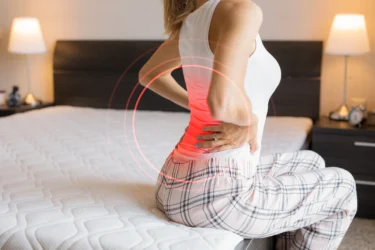
A study3 by Shah et al. in 2015 on thirty young girls from various colleges in Ahmedabad showed that chaturanga dandasana might help to improve endurance and stability of the lumbopelvic region (the lumbar region of the spine). In addition, it may enhance core muscle strength and may reduce the risk of back pain3.However, this is a small-scale study, and more studies are required to check if chaturanga dandasana may reduce the risk of back pain. You must consult your doctor if you have back pain for a long period.
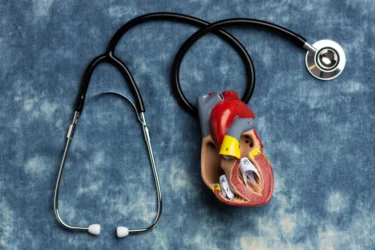
A study on healthy women showed that chaturanga dandasana might help to reduce the strain on the heart by managing stress levels4. However, further studies are required to check if chaturanga dandasana can help to protect the heart. You must consult your doctor if you experience any symptoms of heart disease.

Sakshi Khatri and Manoj Patil 2021 conducted a study on chaturanga dandasana. The study result showed that chaturanga dandasana might help to maintain and stiff and straight posture of abdominal muscle and the back5. In addition, it may improve stability and tone the spine, back, leg, shoulder, neck, wrist, and arms muscles6. However, more studies are required to check if chaturanga dandasana can help to improve posture and flexibility.

In a study6 by Pande et al. in 2020, Surya namaskar consisting of chaturanga dandasana may help in reducing weight. The bends and stretches in chaturanga dandasana may help to lose adipose tissue (fats). However, further studies are required to check if chaturanga dandasana can help to manage weight. You must consult your dietician to assist you in giving you a workout plan to lose weight.

Surya namaskar consisting of chaturanga dandasana may help to improve blood circulation. It may improve scalp blood circulation and help reduce hair fall. In addition, Chaturanga dandasana may help to increase blood circulation in the skin, thereby keeping the skin young6. However, more studies are yet to be done to check if chaturanga dandasana can help to improve blood circulation.

Practising a yoga protocol consisting of chaturanga dandasana can reduce fatigue and inflammation in breast cancer survivors. Disturbed sleep increases inflammation and fatigue. Chaturanga dandasana may help to improve sleep and hence reduce fatigue and inflammation7. However, further large-scale studies are required to confirm whether chaturanga dandasana can benefit breast cancer survivors. Cancer is a dangerous disease; therefore, you must take proper care and not self-medicate.

According to the article8 titled ‘A Role of ‘Surya Namaskara’ For Good Health’, published in 2020, chaturanga dandasana may help improve the lungs’ functioning. It may open the chest cavity and improve the strength of the muscles around the lungs. As a result, Chaturanga dandasana may increase the capacity and contractility of the lungs. However, further studies are required to check whether chaturanga dandasana may benefit the respiratory system.

A study9 by Taspinar et al. in 2014 showed that hatha yoga consisting of chaturanga dandasana might reduce symptoms of depression and anxiety. It may also help to reduce stress and fatigue and improve mood. However, further large-scale studies are required to check if chaturanga dandasana can help to improve mental well-being. You must consult your doctor if your mental health is hampered.
Yoga practice may help balance the mind and body and it is not an alternative to modern medicine. Instead, please consult a qualified doctor who can assess your situation correctly and advise accordingly. Moreover, it is necessary to practice and learn yoga under the supervision of a trained yoga teacher to avoid any injuries.
As we know, Chaturanga Dandasana is practised as a part of Surya Namaskar. It might help in building core strength and improving stamina. This asana should be followed by Adho mukha svanasana (downward-facing dog pose). You should avoid practising this asana if you suffer from headaches, blood pressure issues, or any injury involving the back, shoulder, or arms11.
Dr. Rajeev Singh, BAMS
The following risk may be associated with chaturanga dandasana:
With the guidance of a qualified and experienced yoga teacher/yoga expert, we can access the risk factors and continue to practice exercise with precautions.
Also Read: Benefits of Kandharasana (Shoulder Pose) and How to Do it By Dr. Ankit Sankhe
Chaturanga dandasana is one of the poses done while doing Surya namaskar. Plank pose or four-limbed staff pose are the alternative names of this chaturanga dandasana. In English, ‘that’ means four, ‘anga’ means limbs, ‘danda’ means staff, and ‘asana’ means posture. Chaturanga dandasana is a posture used to build strength. Chaturanga dandasana might help to improve endurance and stability of the lumbopelvic region and reduce the risk of back pain. It may help to improve posture, and flexibility, manage weight, improve lung function, protect the heart, and improve blood circulation. Chaturanga dandasana might help to reduce symptoms of depression and anxiety. It may also help to reduce stress and fatigue and improve mood. Chaturanga dandasana may reduce inflammation and fatigue in breast cancer survivors. Improper practice of chaturanga dandasana may cause wrist or lower-back injuries. Therefore, you must perform chaturanga dandasana under proper guidance.
Chaturanga dandasana might help to improve endurance and stability of the lumbopelvic region and reduce the risk of back pain. It may help to improve posture and flexibility, manage weight, improve lung function, protect the heart, and improve blood circulation. Chaturanga dandasana might help to reduce symptoms of depression and anxiety. It may also help to reduce stress and fatigue and improve mood. Chaturanga dandasana may reduce inflammation and fatigue in breast cancer survivors3,8. However, you must consult your doctor if you have any diseases instead of self-medicating.
Sit in the plank position with both your legs behind and your hands pointing forward. Keep breathing evenly. Stretch out both your heels so you feel the pressure on your thighs. Push the floor away with your hands. Stretch your head and keep your shoulders low, away from the ears1.
Chaturanga dandasana is also known as the plank pose or four-limbed staff pose. In English, ‘chatur’ means four, ‘anga’ means limbs, ‘danda’ means staff, and ‘asana’ means posture1.
Improper practice of chaturanga dandasana may cause wrist or lower-back injuries10. Therefore, you must perform chaturanga dandasana under proper guidance.
Chaturanga dandasana might help to reduce symptoms of depression and anxiety. It may also help to reduce stress and fatigue and improve mood9. You must consult your doctor if your mental health is hampered.
Disclaimer: The information provided here is for educational/awareness purposes only and is not intended to be a substitute for medical treatment by a healthcare professional and should not be relied upon to diagnose or treat any medical condition. The reader should consult a registered medical practitioner to determine the appropriateness of the information and before consuming any medication. PharmEasy does not provide any guarantee or warranty (express or implied) regarding the accuracy, adequacy, completeness, legality, reliability or usefulness of the information; and disclaims any liability arising thereof.
Links and product recommendations in the information provided here are advertisements of third-party products available on the website. PharmEasy does not make any representation on the accuracy or suitability of such products/services. Advertisements do not influence the editorial decisions or content. The information in this blog is subject to change without notice. The authors and administrators reserve the right to modify, add, or remove content without notification. It is your responsibility to review this disclaimer regularly for any changes.
Chocolates are a well known snack for all age groups and are an indulgent confection. The major ingredient of chocolate is cocoa powder which has several health benefits. Cocoa beans are procured from the cocoa tree (Theobroma cocoa) and since 460 AD the cocoa has been used as edible food. Chocolate consumption globally ranges from 0.12 kg per person per year in China to 11.85 kg in Ireland. Developed countries consume about 64% of the total cocoa consumption and the Ivory Coast in Africa is the largest cocoa bean producing country worldwide1. Cocoa is a dried and fully fermented seed of cocoa fruit. The paste made from cocoa beans by grounding, roasting, shelling, and fermenting is the cocoa liquor. Cocoa powder is further made by removing the cocoa butter from cocoa liquor1. There are several health benefits of cocoa powder and let us have a look at it.
Cocoa powder may contain bioactive compounds like polyphenols1. The nutritional content of cocoa powder is:
Several studies showed that cocoa powder might have the following properties:
Some of the potential benefits of eating cocoa powder are described as follows:

The association between cocoa powder and blood pressure was first observed in Zutphen Elderly Study (a major study1 confirmed by randomized controlled trials). Another study suggested that high flavanol consumption like cocoa powder may reduce blood pressure. Cocoa powder may help in reducing blood pressure and more research is required to check whether cocoa powder can reduce blood pressure in humans. However, it is vital to check your blood pressure regularly and consult your doctor in case of high blood pressure.

Cocoa powders may be used against diabetes due to the presence of flavanols. Studies conducted on diabetic rats showed that flavanols might increase insulin secretion and may reduce blood glucose levels. Flavanols in cocoa powder may increase insulin secretion and glucose tolerance which may reduce diabetes. However, these observations were made on animals and further human trials are needed to support the activity of cocoa powder in diabetic individuals. You must check your sugar levels regularly and seek medical advice in case of high sugar levels1. Do not self medicate.

Cocoa powder may help to enhance the immune system, which is suggested by studies conducted on mice. Flavanols present in cocoa powder may be responsible for activating the immune system. Rumiro Puig et al. demonstrated that cocoa may defend the body from free radicals. Further studies on humans are required to confirm the effect of cocoa powder on the immune system1.

Cocoa powder may help in reducing or eliminating cancer. Antioxidant properties of cocoa powder due to polyphenols may be responsible for its anti-cancer activity. Additionally, an experimental study1 suggested that a constituent in a cocoa powder called proanthocyanadins may inhibit the growth of lung cancer cells in humans. However, this information is insufficient, and we require more human studies to suggest the benefits of cocoa powder on cancer. Cancer is a serious disease therefore, get diagnosed and take proper medications instead of self-medicating.

Flavanols in cocoa powder may enhance the mood by reducing mental fatigue and improving self rated calmness. Cocoa powder may lead to the production of serotonin, a hormone that improves mood. More studies are required to check the effect of cocoa powder on mood3.
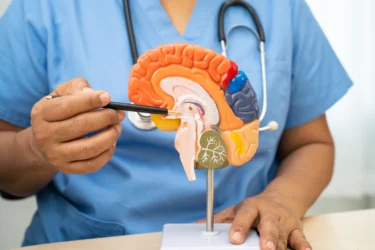
Cocoa powder may be used for Alzheimer’s disease which is a neurodegenerative disorder. Polyphenols present in cocoa powder may help in the case of Alzheimer’s disease through their antioxidant activity. In vitro studies suggest that polyphenols may have a neuroprotective effect. However, more studies are required to check the effect of cocoa powder on Alzheimer’s disease. You must consult your doctor if you experience any symptoms of Alzheimer’s disease3.

cocoa powder may help in weight loss and may lower the Body Mass Index (BMI). Studies on animals have shown that cocoa powder may reduce body weight. Cocoa powder may inhibit dietary fat absorption and thereby cause a reduction in the rate of body weight. More studies are required on the human body to confirm if cocoa powder can be used to reduce weight. However, you must consult a dietician before making significant changes in your daily meals3.

Cocoa powder may reduce the risk of stroke and a study was conducted on 37103 volunteers for over ten years. The results suggested that people who consume a large amount of cocoa powder may have a reduced stroke risk compared to those who do not consume cocoa powder. Antioxidant, anti-platelet, and anti-inflammatory mechanisms of cocoa powder may be responsible for lowering the risk of stroke. However, you must immediately consult your doctor if you experience any stroke symptoms3.
Though some studies show the benefits of cocoa powder in various conditions, these are insufficient. Therefore, there is a need for further studies to establish the true extent of the benefits of cocoa powder on human health.
In my experience, more cocoa powder in your diet may assist to enhance your attention span, working memory, and overall cognitive function. Additionally, it may improve cognitive function in those who have sleep-related problems such as insomnia5.
Dr. Siddharth Gupta, B.A.M.S, M.D (Ayu)
Cocoa powder may be included in several foods and beverages like:
You must consult a qualified doctor before taking cocoa powder in large quantities or any herbal supplements. Do not discontinue or replace an ongoing treatment of modern medicine with an ayurvedic/herbal preparation without consulting a qualified doctor.
Magnesium has a critical role in controlling muscle contraction and supporting neuronal activity. Additionally, the mineral may lower the danger of neurological illnesses while defending nerve cells. I strongly recommend consuming cocoa powder as it may help support healthy muscular and neurological system function since it includes magnesium5.
Dr. Rajeev Singh, BAMS
A few side effects associated with cocoa powder may be:
If you experience any adverse reactions to cocoa powder, immediately contact a doctor or your Ayurvedic physician who has prescribed it. They will be able to guide you appropriately for your symptoms.
I have studied that zinc is a mineral and is abundant in 90% cocoa chocolate. I strongly recommend consuming cocoa powder as it may help aid in wound healing5.
Dr. Smita Barode, B.A.M.S, M.S.
Also Read: White Onion: Uses, Benefits, Side Effects By Dr. Smita Barode
You must take the following precautions while consuming cocoa powder:
Also Read: Pear (Nashpati): Uses, Benefits, Side Effects and More!
Some precautions to take before consuming cocoa powder are:
Also Read: Tagar: Uses, Benefits, Side Effects and More!
Cocoa powder may be used against diabetes, stroke, Alzheimer’s disease, and weight management. It may lower blood pressure. It may also enhance the mood and the immune system1,3. However, if you have the above-mentioned problems kindly, consult the doctor and do not self-medicate.
Several minerals like calcium, potassium, phosphorus, sodium, and many more are present. It also contains vitamins, sugars, fibres, and fats2.
Yes, cocoa powder may be good for managing weight. It may help reduce weight and maintain body mass index (BMI)3.
Polyphenols and flavanol are cocoa powder antioxidants1.
Disclaimer: The information provided here is for educational/awareness purposes only and is not intended to be a substitute for medical treatment by a healthcare professional and should not be relied upon to diagnose or treat any medical condition. The reader should consult a registered medical practitioner to determine the appropriateness of the information and before consuming any medication. PharmEasy does not provide any guarantee or warranty (express or implied) regarding the accuracy, adequacy, completeness, legality, reliability or usefulness of the information; and disclaims any liability arising thereof.
Links and product recommendations in the information provided here are advertisements of third-party products available on the website. PharmEasy does not make any representation on the accuracy or suitability of such products/services. Advertisements do not influence the editorial decisions or content. The information in this blog is subject to change without notice. The authors and administrators reserve the right to modify, add, or remove content without notification. It is your responsibility to review this disclaimer regularly for any changes.
A lipoma is a round or oval-shaped tissue mass that develops right under the skin. It composed of fat and moves easily when touched and rarely causes any discomfort. Lipomas can form in any body part, although the back, torso (trunk), arms, shoulders and neck are the most common parts.
Lipomas are slow-growing, soft tissue tumours that are typically benign (non-cancerous). In some cases, they may be mistaken for liposarcomas, which are rare malignant tumours; however, liposarcomas usually present differently and require specialist evaluation2.
Most lipomas don’t require treatment unless symptomatic. If a lipoma bothers you, you can consult a doctor and get it operated on.
According to healthcare professionals, the exact cause of lipoma development remains unclear. However, they often have a genetic link, if a family member has a lipoma, your risk of developing one is higher.
Several conditions are also known to be associated with the formation of multiple lipomas, such as:
Lipomas are usually not painful, although they can be bothersome if they push against a nerve or form near a joint. Many patients with lipomas do not experience any symptoms. Lipomas are typically encapsulated and they do not disseminate to the surrounding tissues.
While scientific evidence supporting the effectiveness of home treatments for lipomas is limited, some traditional practitioners believe that certain herbs and plant-based ingredients may offer benefits for managing the condition. Below is a list of popular natural remedies to consider but keep in mind that none of these can cure or prevent lipomas.

To support your body and reduce inflammation, include healthy fats, especially omega-3 fatty acids, in your meals. These essential fats are known to calm inflammation and promote overall wellness. At high enough levels, omega-3s help reduce inflammatory compounds in the body, such as cytokines and reactive oxygen species, which may play a role in fatty tissue growth.
Natural sources of omega-3 fatty acids include wild-caught salmon, sardines, flaxseeds, walnuts, chia seeds, and hemp seeds. You can eat them directly or use their oils in cooking or homemade remedies. When used consistently, these nutrient-rich fats can support the body’s natural balance and may help reduce discomfort linked to lipomas5.
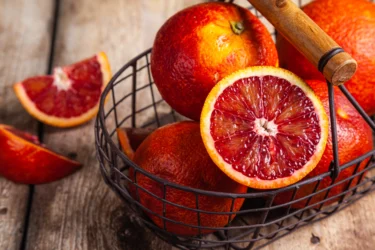
Bioactive compounds found in Moro orange extract (found in blood orange) have demonstrated lipolytic effects, meaning they help break down fat cells. Studies6 suggest that these compounds, particularly anthocyanins like cyanidin-3-glucoside, may support the reduction of abdominal fat by enhancing fat metabolism and reducing the accumulation of fat in adipose tissue. This makes Moro orange extract a potential natural aid in managing localized fat deposits, including those seen in conditions like lipomas.
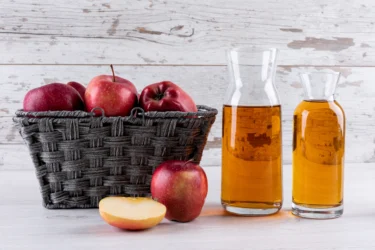
Apple cider vinegar is rich in acetic acid, has been studied for its potential to reduce fat accumulation and support metabolism. Research7 on obese rats and mice suggests that acetic acid may help prevent fat buildup in the body. To gently support your system, consider a daily detox drink that includes apple cider vinegar along with natural ingredients like ginger and raw honey. This combination may aid in overall detoxification and offer subtle support in managing fatty growths like lipomas.
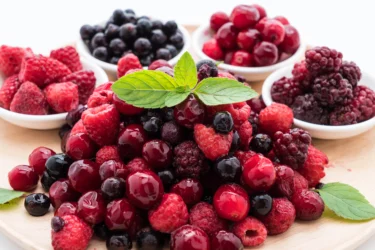
Adjusting your diet may help support the body’s natural balance in individuals with lipomas. Brightly coloured fruits and vegetables are rich in antioxidants, which may help lower fat levels in the blood and reduce oxidative stress. Prioritise foods like berries, leafy greens, and carrots for their vibrant nutrient content8,9.
Focus on eating natural, minimally processed foods to reduce exposure to environmental toxins and synthetic additives. Lastly, reduce alcohol consumption and avoid smoking, as both can negatively impact overall health and potentially worsen fatty tissue imbalances.
Consult a doctor if you notice a skin outgrowth, lump, or knot beneath your skin. It’s critical to get it checked and rule out any dangerous illnesses like liposarcoma (a type of cancer)2.
If you have a lipoma and experience any symptoms, such as acute discomfort, consult the doctor immediately. In case your lipoma is developing quickly (over weeks), feels firm or doesn’t move as readily when touched, you must seek medical attention. Your physician will physically examine the lipoma to determine the right treatment for it.
Also Read: Natural Home Remedies for Blood Clots
Lipomas are common and affect millions of individuals. While they can be bothersome or cosmetically unappealing, they rarely lead to serious health problems. Most lipomas don’t require treatment, but it’s important to have them evaluated by a healthcare professional. If a lipoma causes pain or shows rapid growth, be sure to consult your doctor. When removal is necessary, lipomas are typically taken out through minimally invasive surgical procedures.
Lipomas can form in any part of the body. Although multiple lipomas can grow, most people only have one. These mostly form just beneath the skin on the following areas:
-Arms or legs
-Back
-Neck
-Shoulders
-Trunk (chest and torso)
-Forehead
If a lipoma causes discomfort or concern, the doctor can surgically remove it. Lipoma removal is a simple and quick procedure and in most cases, patients are able to return home the same day. As an alternative, liposuction may be considered. In this procedure, a physician uses a thin, hollow instrument to extract fatty tissue from the lump. The choice of treatment depends on the size, location, and nature of the lipoma, and should be discussed with a qualified medical practitioner.
Lipomas are common and affect about one in every 1,000 people. Lipomas more frequently occur in people between the ages of 40 and 60 but can occur at any age, including at birth. Lipomas are found in both men and women, though some studies2 suggest that they are more prevalent in women.
Disclaimer: The information provided here is for educational/awareness purposes only and is not intended to be a substitute for medical treatment by a healthcare professional and should not be relied upon to diagnose or treat any medical condition. The reader should consult a registered medical practitioner to determine the appropriateness of the information and before consuming any medication. PharmEasy does not provide any guarantee or warranty (express or implied) regarding the accuracy, adequacy, completeness, legality, reliability or usefulness of the information; and disclaims any liability arising thereof.
Next Page »« Previous Page